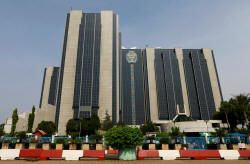Nigeria's economic troubles in five charts
 Send a link to a friend
Send a link to a friend
 [July 27, 2021] By
Chijioke Ohuocha and Libby George [July 27, 2021] By
Chijioke Ohuocha and Libby George
ABUJA/LAGOS (Reuters) - Nigeria's central
bank meets on Tuesday to set interest rates.
Analysts expect it to keep borrowing costs on hold at 11.5% for a fifth
consecutive meeting as it tries to boost growth that is still struggling
after last year's dual hit of the COVID-19 pandemic and plunging oil
prices.
Policymakers in Africa's largest economy and most populous nation must
consider a range of facts as they balance political priorities including
defending the naira and capping gasoline prices.
Below is a look at five key figures that concern investors and experts.
GROSS DOMESTIC PRODUCT
Graphic: Two recessions, and years of sluggish growth: https://graphics.reuters.com/NIGERIA-ECONOMY/dwpkrgekdvm/chart.png
Nigeria narrowly exited its second recession in four years in late 2020,
and growth remains fragile.

Economists say growth must pick up speed in order to help citizens
grapple with galloping inflation. Nigeria's population has expanded
faster than its economy every year since 2015, according to the World
Bank, and stagflation, when inflation outstrips low growth, frustrates
policymakers.
INFLATION
Graphic: High inflation pressures Nigerian consumers: https://graphics.reuters.com/NIGERIA-ECONOMY/dwpkrgekdvm/chart.png
Rising prices for everything from tomatoes to shoes are pressuring
Nigerian households. Inflation hit a four-year high in 2021 due to
COVID-19 and an oil price drop that weakened the naira.
The World Bank estimates that price shocks pushed 7 million additional
Nigerians into poverty last year, an increase of nearly 10%. Their
limited purchasing power could in turn stifle economic growth.
THE NAIRA CURRENCY
Graphic: Persistent gap between official naira and parallel rates:
https://graphics.reuters.com/NIGERIA-ECONOMY/zjvqkqwmkvx/chart.png
Nigeria relies on oil for 90% of foreign reserves, so last year's price
crash severely limited access to U.S. dollars.
[to top of second column] |

A view shows Nigeria's Central Bank headquarters in Abuja, Nigeria
November 22, 2020. REUTERS/Afolabi Sotunde

Multilateral institutions say a free-floating naira would help Nigeria's economy
withstand future shocks, but authorities fear a sharp devaluation could worsen
inflation.
The central bank has devalued the naira's official rate three times since the
pandemic took hold early last year, and has limited dollar access for imports.
The gap between the official and parallel rates has nevertheless persisted.
FOREIGN RESERVES
Graphic: Nigeria's falling foreign reserves : https://graphics.reuters.com/NIGERIA-ECONOMY/dwpkrgeedvm/chart.png
Despite rebounding oil prices, and consistent efforts to limit access to forex,
foreign reserves have been falling.
Dollar shortages have contributed to rising inflation, while businesses say lack
of access to foreign currency has hindered their ability to expand.
OIL PRICES
Graphic: Government's gasoline import costs rise with oil price: https://graphics.reuters.com/NIGERIA-ECONOMY/gdvzyrdabpw/chart.png
The government has said letting gasoline prices float would be too painful for
consumers grappling with rising inflation.
The resulting price controls leave state oil company NNPC as the sole importer,
and rising crude prices mean NNPC has likely incurred losses on every litre sold
since December.

Daily consumption of roughly 40 million litres means the gap in June between
market prices and the ex-depot price in Lagos of more than 100 naira per litre
implies billions of naira in losses.
($1 = 411.00 naira)
(Reporting By Libby George; Editing by Catherine Evans)
[© 2021 Thomson Reuters. All rights
reserved.] Copyright 2021 Reuters. All rights reserved. This material may not be published,
broadcast, rewritten or redistributed.
Thompson Reuters is solely responsible for this content. |